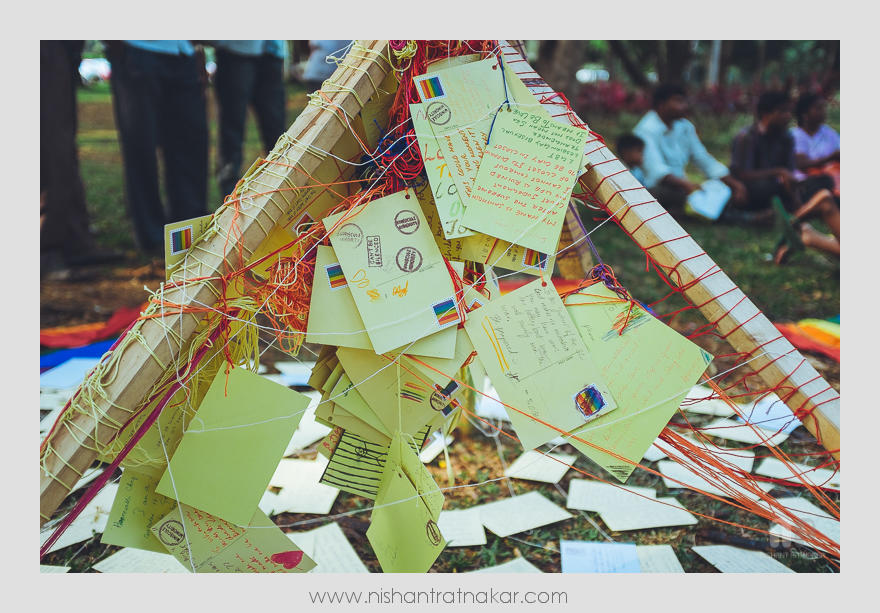
Last week, I traveled to various locations of the city (Bengaluru/Bangalore) on an assignment for an NGO. The assignment involved making portraits of people from a marginalized section of our society – the working class sexual minorities. The assignment would continue for some more time and I will be traveling to remote districts of the state to make more portraits and visuals of almost invisible people – the people who probably find very little or no mention in the manifesto documents of major political parties of India for the ongoing 2014 Lok Sabha elections.
The assignment had nothing to do with the ongoing elections. But, conversations with the people who I photographed did revolve a lot around aspirations, fears, dreams, and of course, the big elections. When Delhi High Court struck down section 377 (which criminalized homosexuality), people saw it as a defining moment in LGBT rights movement in India. Many started being more open about their gender and sexual identity. They sensed a change and hoped that this was a beginning for all things good though it would still be a long journey with many road blocks. Little did many from the queer community realize that one of the roadblocks would be the Honorable Supreme Court overturning the Delhi High Court judgement.
It all seemed futile and abrupt. In the process of change, your families have begun to accept you, but suddenly the nation makes your identity a crime. You came out of the closet, there is no going back, it is a one way road with your identity in open. It is easier to be exploited. Section 377 might have hardly been used to prosecute people in this country, but it indeed has been many a times just to exploit and extort.
Many of the people who I spoke to say that have lived a life under the shadow of 377, that brief period between the Delhi High court verdict and Supreme Court overturning that judgement, and are now almost back to living that life under 377 again. They want section 377 to go. But section 377 is not the biggest worry. There are fears worse than that.
I was at Cubbon Park, where many members from the LGBT community had gathered for a meeting. They were collecting postcards addressed to the honorable Chief justice of India at Supreme Court. Supreme Court had observed the members of LGBT community as “minuscule” portion of Indian population while striking down the Delhi High Court ruling. They were trying to send a message to the Chief justice that they are not minuscule in numbers and that request the CJ to review the judgement. I am unsure how many mainstream media houses covered this event. Very few I guess.
On the sidelights of this event I made some more portraits for the assignment. And many conversations followed. A young, working class, transsexual woman asked me if I could help her get contacts in the modelling industry. She aspires to be a model but has no clue how to go about it. She asked me if I could do a portfolio shoot for her, would it in any way help her get into the modelling world or advertising world 🙂 . I wonder how many advertisers out there in India would want to have a model from a marginalized section of the society to endorse or advertise their products. Anybody there?
And then followed questions on voting rights, parties and politics. Their worst fears began to show here. There is a perception that the Narendra Modi led BJP/NDA government would replace the incumbent Congress led UPA government at the center soon after this elections. While most parties have reacted to Supreme Court verdict with a suggestion of political intervention as a solution to do away with the law like section 377 that criminalized gay sex, BJP is the only party that has openly endorsed the views of the Supreme Court. There is no mention of doing away section 377 in BJP manifesto. BJP has openly supported section 377. One of BJP’s backers Baba Ramdev even made claims that he has a “cure” for homosexuality. Parties make manifesto to appeal to its voters. If the BJP manifesto and its stand in favour retaining section 377 appeals to the majority of voters, then BJP would be in power. What would happen when a party whose ideology is deep-rooted in right-wing and orthodox views come to power? Would the marginalized people, like sexual minorities find any representation or support there? Would the exploitation sexual minorities get even worse? These were some of the worst fears shared during the conversations.
How to put an end to these fears? How do the marginalized get representation in democracy – a process where the majority wins and comes to power? There should ways to address issues of the rights and liberties of the marginalized. At the least, their very own identity should not be criminalized.
- SIGMA 23mm F1.4 Lens Review - September 8, 2023
- SIGMA Lens Review for Fujifilm - January 16, 2023
- Family Time – My Lockdown Diaries - May 8, 2020

